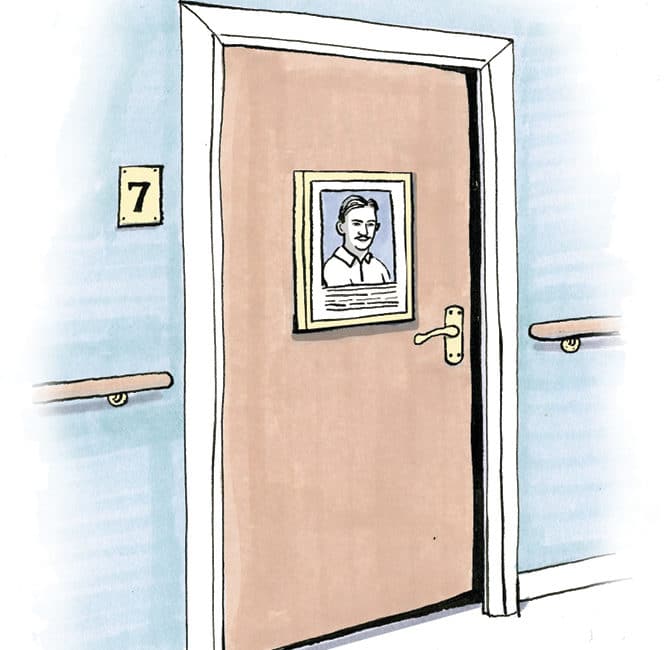
Last Word: Deborah Paul on Nursing Home Dignity
The year is 1994, and I’m visiting the nursing home where my father has become a “resident,” although he keeps saying his home is on Meridian Street, not here. He’s right, of course, but for those whose failing years are spent in such facilities, there is no going back.
As I walk the hallways to his wing, I am struck by a thought: Do the staff and visitors really know these residents? Or are the inhabitants just the decrepit, ancient people whose current photos are posted outside their rooms? My dad never looked like this: vacant, slumped, his hair wild. Why, he was a handsome charger with snow-white hair so evenly waved you could put your finger between each crimp and not disturb the rest. His mustache was perfectly trimmed above his lip; his blue eyes sparkled. He told jokes he called “Indiana corn” that we still repeat. “I’ll have the halibut,” he’d say to a waiter, “just for the halibut.” He sold auto parts from his store on South Keystone Avenue, came home with grease under his fingernails that he scrubbed away with Lava soap, and occasionally took a nip of Wild Turkey from a shot glass before dinner.
I wish a short bio were posted by his door telling who he was, not who he has become. I want it to say that he skipped so many grades in school, he had to stand on a chair for his class picture so that he would seem the same age as his classmates. I want it to say that, when asked why he stood by the foot of his bed in the dark of night, he would answer, “To let the worry run down.” And I want it to include the poetic words he wrote to my mother in love letters when they courted.
What if there were a concert pianist residing in this facility, an English professor, a judge? Who would know? Perhaps we would be more inclined to respect the pitiable, demented dwellers if we realized who once lived inside the shell that houses them now.
I would have said he wiggled his youngest daughter’s toe to wake her for school, told her to say to cruel children who laughed at her big feet that she had “good under-standing.”
For a while, I thought of starting a business in which I would interview families and write these profiles, then charge nursing homes a nominal fee to post them by the inhabitants’ doors. A communications executive advised me this felt more like a volunteer project. I should undertake the selfless assignment, I suppose, but my father has been gone for 21 years, and without a personal stake, I probably never will.
I like truth, and often speak it out of turn. Perhaps that is why I have noticed—and enjoy—what has become of today’s obituaries. Once the domain of newspaper reporters on the lowest rung of journalism, who begrudgingly recorded the departed one’s age, the organizations to which he belonged, and the family members left behind, these final published records now depend on the creativity of a family member or friend. Because they are essentially paid ads, inside information can be shared.
The pure facts have gone by the wayside, replaced by anecdotes that provide a glimpse into one’s genuine character. Terms of endearment are used, like “Pappy” or “MawMaw,” and even pets like “Grand-Pawppy Baxter” are recalled. One soul enjoyed describing her chance encounter with Lucille Ball, and another, a gentleman who looked cheerful in his photo, was said to have danced the polka.
I have come across some particularly memorable tributes in a Florida newspaper with an even more freewheeling approach toward mortality. One woman, an obituary read, left behind a “hell of a lot of stuff that her children have no idea what to do with,” and would be remembered for her “99-cent store hauls, inappropriately timed jokes, and the annual Thanksgiving Turkey Song.” I would like to have known her.
The unadulterated truth was told of a 94-year-old woman, described as a terrible cook who could pick apart a meal at the finest restaurant, complain to the waiter, and then ask for a to-go bag. She stole things from hotels, figuring she’d paid for them, knitted gifts with mismatched yarn, and believed she was related to the Kennedys. She never forgot and never forgave, the homage went on, but when she loved you, she loved you forever and with her whole heart.
I’d like to know the stories about these dear eccentrics before—not after—they pass. If I were to have written my father’s biography, I would have related one of his favorite lines, long ago used to attract wary potential girlfriends. “Did you like olives the first time you tried them?” he would ask. “Won’t you give me the same chance you gave an olive?”
I would have said he wiggled his youngest daughter’s toe to wake her for school, told her to say to cruel children who laughed at her big feet that she had “good under-standing,” and crept into her room to cover her with blankets in the night.
This was my father: a human dynamo short of stature but long on smarts, devotion, and humor. He will never be remembered as he appeared in that unrecognizable photo by his nursing home door—not, at least, by those of us who knew and loved him.
Illustration by Clare Mallison





